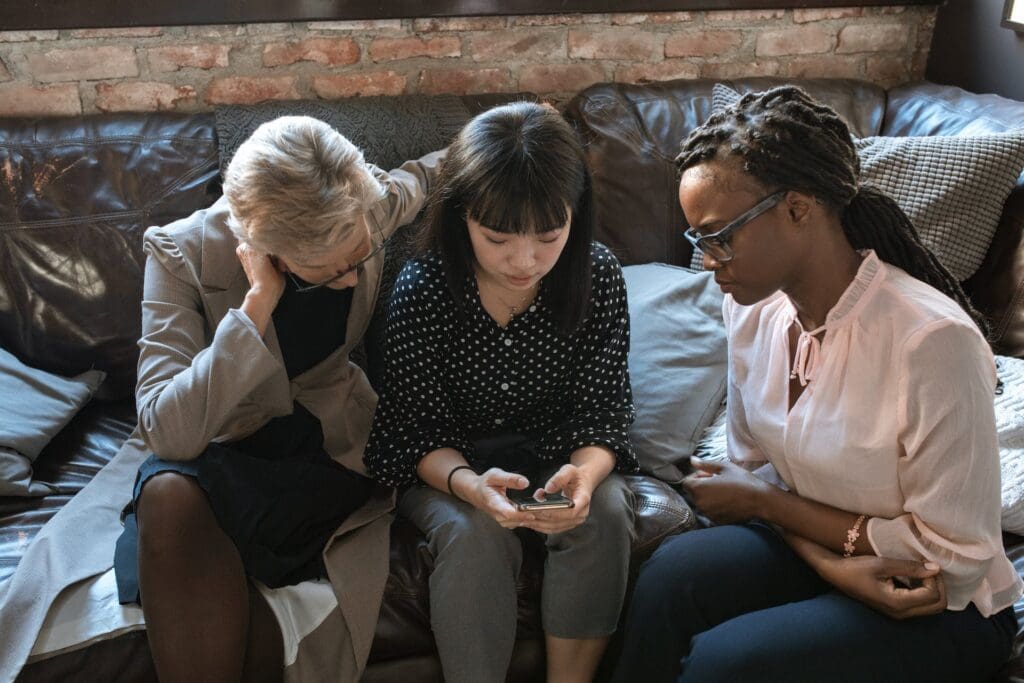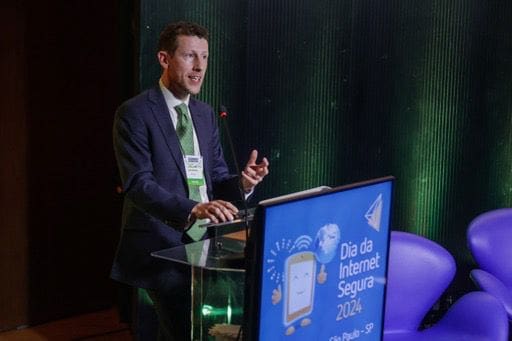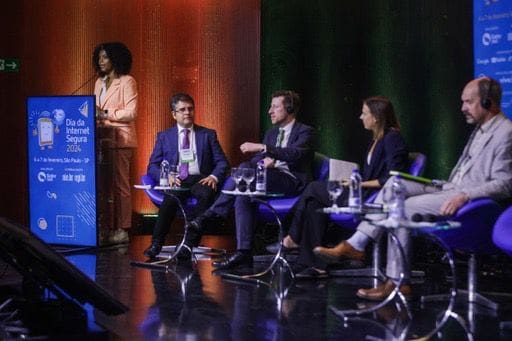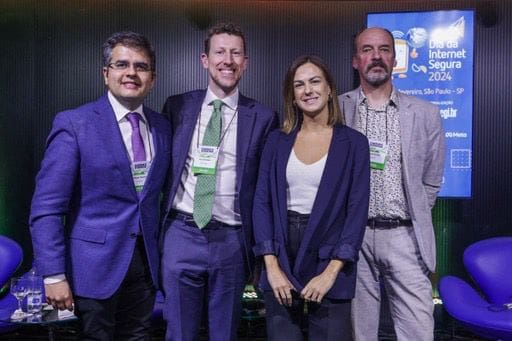The importance of a truly global Alliance – reflections from Brazil

Our Executive Director Iain Drennan and Membership Engagement Manager Stephanie Quintao recently travelled to Brazil to mark Safer Internet Day (6 March) at a conference hosted by our friends at, SaferNet Brasil, in São Paulo. In this blog they share their reflections from the conference and the power of the Alliance’s global membership.
Brazilian NGO SaferNet Brasil has been monitoring the internet for almost two decades, with a focus on the exploitation and abuse of children online. In a report published this week, they revealed that in 2023, there were 71,867 new reports of child sexual abuse images in Brazil, an increase of 77% compared to the previous year and the highest number in their data series, which began in 2005.
The report was announced on Safer Internet Day at their conference in Sao Paulo, which brought together hundreds of participants from all corners of this huge and diverse country to talk about key issues. WeProtect Global Alliance had the honour of giving the keynote speech, sharing emerging threats, trends and responses.
Brazil is a Global Task Force member and an active participant in the Alliance, especially through government and civil society engagement, and it was fantastic to hear and understand the perspectives of our Brazilian members and other organisations working in the sector in person.
During our very first visit to Brazil, we were able to build relationships with new government ministries, civil society organisations and the tech industry. We learnt an enormous amount about challenges and opportunities facing Brazil.
For example, in Brazil, 92% of 7–13-year-olds have internet access. But access is not homogenous and can vary from a child in an indigenous community in rural Amazonas state who’s just getting access on a shared mobile, to child with fluent English in São Paulo gaming and communicating on multiple devices with adults and children globally. It is a complex challenge finding the best responses to keep children safe online working across such diverse groups of children.


It may surprise many people to know that Brazil is TikTok’s 3rd largest market in the world. And regional engagement is powerful – what happens in Brazil has big influence in other countries in Latin America and beyond.
Brazil is open to multi-stakeholder partnerships and there is a good tradition of dialogue. There was diverse representation from the tech sector at the conference (TikTok, Meta, Google) and they were open in sharing their challenges and underlined the need for dialogue. As we plan for our upcoming Global Summit, we would welcome more interactive dialogue with the tech sector.
Like many countries, there is limited government funding and investment in the civil society sector, but Brazil has put in place strong legislation, with a proposal under consideration in the Senate to criminalise those who create and disseminate images (photo and video) of nudity and sexual content of a person using artificial intelligence in Brazil. Online safety also has a strong advocate in Estela Aranha, Secretary for Digital Rights at Ministry of Justice and Public Security, who supported a stronger focus on prevention when she spoke at the conference.
Michael Sheath from INHOPE reflected that the internet was created by “utopians” – focusing on benefits and positives – but being exploited by “dystopians” seeking to leverage vulnerabilities to groom, manipulate and abuse children. He also advocated for safety by design and effective offender deterrence and management.
Virgilio Almeida (Professor Emeritus of Computer Science at UFMG (Federal University of Minas Gerais), Faculty Associate at Berkman Klein Center, Harvard) gave a challenging and inspiring talk on artificial intelligence (AI) and reinforced the urgent need for human review and safety by design. He cited guidance from eSafety Australia on AI product development, and the need to build partnerships with industry.
It was also wonderful to see a strong example of participation. Safernet, in partnership with the UK government, awarded the Prêmio Cidadania Digital em Ação (Digital Citizenship in Action Award) to a school for their work keeping children safe online. More than 150 schools throughout 27 different regions in Brazil participated and showcased student projects on digital safety, including podcasts, social media and other content highlighting hate speech and cyberbullying. These projects featured genuine youth engagement and empowered young people and teachers to address and participate in digital safety. The projects truly reflected the responses that children and young people want to see and that are relevant to them. It was clear that both teachers and students were incredibly proud of what they had achieved.
Our visit also brought home the importance of language skills in understanding culture and nuances. It was very useful that Stephanie has Brazilian heritage and can speak Portuguese. Our future ambition for the Alliance is to be able to communicate directly with even more stakeholders in more languages. This was also highlighted in our recent Global Threat Assessment where CRISP data highlighted the most prevalent languages for terms signifying risk to children. From January to June 2023, Portuguese grew by 29%. Accurate risk detection requires not only translation but cultural understanding to capture colloquialisms, intentional evasion, associated slang, or veiled language
While not specific to Brazil, it was also timely that on Safer Internet Day Meta announced via a blog on their website it was working to detect and label AI-generated images on Facebook, Instagram and Threads as the company pushes to call out “people and organisations that actively want to deceive people”. It is a welcome announcement and we hope to do more proactive work with our private sector members like Meta this year.
Safer Internet Day is genuine global moment of action and a powerful tool to bring together all forms of online harms and share learning. SaferNet did a brilliant job in bringing together the Brazilian community and providing a forum to engage with the local and international community.

We look forward to continuing to work with our members in Brazil and across Latin America – together we can create a digital world digital world designed to protect children from sexual exploitation and abuse.
About Safernet Brasil
SaferNet is the first-ever NGO in Brazil to establish a multistakeholder approach to protect human rights in the digital environment. It created and has coordinated since 2005 the National Human Rights Cybertipline, the National Helpline and the Brazilian awareness node, and has more than 17 years of experience in capacity building programmes with educators, young people, legislators, policy makers and social workers.
Safer Internet Day Brazil has been coordinated by SaferNet since 2009 in a close partnership with the Brazilian Internet Steering Committee (CGI.br), the Brazilian Network Information Center (NIC.br), UNICEF, the Federal Prosecutors Office and has support from Google, Youtube, Meta, TikTok and Vivo.
Page last updated on 14th November 2024